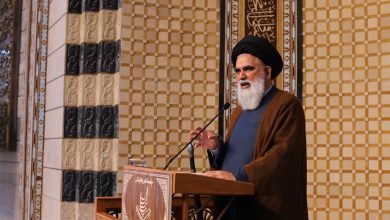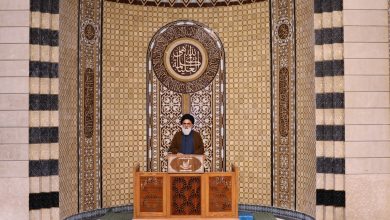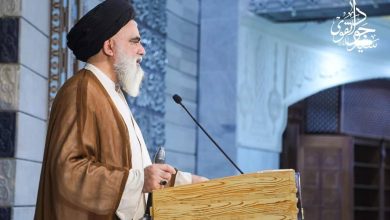What can be state of person when every step is towards death
Hujjatul Islam Ustad Syed Jawad Naqvi
(Principal Jamia Orwatul Wuthqa – Lahore)
Delivered at: Masjid Baitul ul Ateeq
Lahore – Pakistan
Friday Sermon – 24th January 2025
Sermon 1: Taqwa in Maishiyat (means of living)
Sermon 2: Saying no 115: What can be state of person when every step is towards death
Religion encompasses a vast and expansive domain. The complexity of human existence, the intricacies of life, and the safeguarding of life have been recognized by select scholars, yet there remains a certain stagnation in these areas, leading to a limited understanding of religion.
Economics is a crucial aspect of life. The term “Maishiyat,” referring to the means of living, serves as a fundamental pillar of human existence, upon which both this worldly life and the afterlife rely. Every individual requires financial resources, a system ordained by Allah. Human beings are inherently dependent on various means of sustenance at every moment. Essential needs include food, clothing, and shelter, as well as transportation for mobility. These means of living rely on finances, which, in contemporary terms, manifest as money or currency. These notes represent wealth but are not wealth in themselves; true assets are what we obtain in exchange for these notes.
If we treat wealth as the ultimate goal of life, society will gravitate towards this singular pursuit, leading to misguided priorities. When wealth is viewed as a means, its value increases; however, when it becomes the end goal, it leads to disgrace. For instance, if someone owns a car merely for show, it holds no real value, much like a car displayed in a museum. If material possessions become the primary focus of life, driven by a desire for status and the false notion of elevated standing, it does not enhance one’s character. As long as means remain merely that—means—they hold value. When resources become scarce, societal difficulties arise, as seen in Pakistan today, where wealth is concentrated in a few hands, leaving many without access.
Religion emphasizes that the esteemed purpose of life can only be achieved through means. For a child to receive an education, necessities like uniforms, food, and books are essential. The understanding of wealth and assets has evolved, and scholars may need time to adapt. Non-material assets also hold value, even if they lack a physical form. Software, for example, represents the assets of developers but cannot be seen in tangible terms. In today’s world, soft and digital assets are among the most valuable, with the wealthiest individuals often deriving their fortunes from technology and digital resources. However, many scholars do not recognize these digital assets as true wealth; if they did, all religious taxes would apply to them. Traditional assets like livestock and grains are considered wealth, while modern equivalents like software and vehicles are overlooked for the purposes of Zakat. The Quran instructs the Prophet to collect Zakat forcefully from those who possess it, as believers are expected to give but often do not. Shia Muslims, for instance, may choose to give Khums instead.
Khums is calculated on savings remaining after essential expenditures, and everyone has something left over from purchases. Anything unused qualifies as savings subject to Khums. Therefore, it can be argued that everyone, regardless of their wealth, is eligible for Khums. However, many fail to keep proper accounts, prompting a need for authorities to intervene and create tax departments to audit and collect Khums. If both wealthy and poor Shia Muslims in Pakistan were to contribute Khums, the community would become significantly prosperous. Eliminating barriers to Zakat and Khums could meet all community needs.
The Prophet (s) was tasked with collecting Sadaqat due to the people’s reluctance to give willingly. In his time, wealth consisted primarily of dates, barley, and raisins, as those were the prevalent resources. However, today’s assets have transformed, with digital wealth taking precedence. Those who control digital assets dominate the global landscape, yet many jurists (Fuqaha) fail to recognize them as legitimate wealth, focusing instead on traditional assets like dates. Thus, if Elon Musk were to grow dates, he would be deemed taxable under Zakat according to our jurists. This perspective limits the definition of wealth to physical assets only, disregarding the potential of digital resources.
Humans naturally gravitate towards wealth, which acts like a magnet, drawing individuals towards it. To manage this attraction, a system of laws, limits, and policies is necessary to govern how wealth is earned, spent, and circulated. The Quran provides detailed guidance on economic matters, including concepts like Infaq, and emphasizes the importance of Taqwa as a protective mechanism in financial dealings.
Wealth can be categorized into personal and public assets. Governmental resources are regarded as public treasury (Bait ul Maal). Taqwa is essential in managing wealth; without it, the waste of money pales in comparison to the moral degradation of individuals. I often remind students at Jamea that failing to maintain discipline in financial matters can lead even the righteous astray. Handing money to students without a system can result in wasted resources and diminished character. In reality, wealth can corrupt individuals more than individuals can waste wealth.
Imam Ali (a.s) advises believers against testing themselves with two things: women and wealth. Engaging with these temptations can lead to downfall. The prescribed solution to the first challenge is marriage upon reaching puberty, which should not be postponed for educational pursuits. After puberty, both marriage and adherence to religion become imperative. Delaying marriage under the pretext of preserving purity can lead to greater harm. Providing smartphones to children before marriage can expose them to temptations.
Taqwa is essential for navigating the challenges posed by wealth and women. Despite widespread corruption, our society often prides itself on being religious, receiving praise from others. Different forms of wealth require distinct approaches to protection. Terms like Anfal, Fay, and Ghanimah denote various types of wealth, and Allah (s) emphasizes the importance of Taqwa in relation to Anfal, as highlighted in the opening verse.
!يَسْأَلُونَكَ عَنِ الْأَنْفَالِ ۖ قُلِ الْأَنْفَالُ لِلَّهِ وَالرَّسُولِ ۖ فَاتَّقُوا اللَّهَ وَأَصْلِحُوا ذَاتَ بَيْنِكُمْ ۖ وَأَطِيعُوا اللَّهَ وَرَسُولَهُ إِنْ كُنْتُمْ مُؤْمِنِينَ {1}
They ask you about the “Anfal”. Say: The “Anfal” are for Allah and the Messenger. So be careful of (your duty to) Allah and set aright matters of your difference, and obey Allah and His Messenger if you are believers.
They inquire about Anfal, which belongs to Allah (s) and His Messenger. Settle your internal conflicts and obey Allah and His Messenger (s) if you truly believe. This discipline applies to believers, but you have the choice to refrain from identifying as a believer. The greatest privileges for a person are being human and being a believer.
These guidelines pertain to wealth (Anfal). Here, the concepts of Taqwa regarding Anfal, as well as the resolution of disputes related to it, are clearly delineated within the broader context of wealth management.
SERMON 2
Allah (s) has made arrangement for presenting lives of Taqwa in form of role model. The personalities who have lived a secure life , covering all the ups and downs of life are Prophets and specifically the Last Prophet (s.a), then Imams (a) and amongst Imams as well the most apparent personality to visualize Taqwa is Ameerul Momineen (a.s). He (a) has established Taqwa in a comprehensive form. Amongst these there are wise sayings of AM which are foundation of Taqwa. In saying 115 , he says
Abdullah ibn Jafar (or possibly someone else) asked him (a)
. وَ قِيلَ لَهُ عليه السلام: كَيْفَ نَجِدُكَ يَا أَمِيرَ الْمُؤْمِنِينَ فَقَالَ ع: كَيْفَ يَكُونُ حَالُ مَنْ يَفْنَى بِبَقَائِهِ وَ يَسْقَمُ بِصِحَّتِهِ وَ يُؤْتَى مِنْ مَأْمَنِهِ
It was said to Amir al-mu’minin, peace be upon him: How are you, O Amir al-mu’minin? and he replied: How can he be whom life is driving towards death, whose state of healthiness can change into sickness any moment and who is to be caught (by death) from his place of safety.
How do you find yourself these days? In some accounts, it is said that he was asked how we might find him these days. Imam Ali (a.s) responded by questioning how one could be in a state where survival leads to dying, health brings sickness, and one exists under the shadow of death in a seemingly safe place.
Amirul Momineen (a.s) did not respond in the conventional manner where one might say “Alhamdulillah” or express their struggles. Instead, he presented a perspective that goes beyond mere thanks or complaints. The frequency of the questioner and the respondent does not align. Often, a person may be preoccupied with thoughts or subjects that the average individual does not contemplate. While many people share common thoughts, there are very few whose concerns and reflections diverge from the norm. When they articulate their thoughts, their frequency seems out of sync with that of ordinary individuals.
The questioner here expected a simple acknowledgment of gratitude or a complaint. However, Amirul Momineen (a.s) was not focused on the question itself; his thoughts and concerns were directed towards deeper subjects that the questioner might not consider. This reflects a continuous state of contemplation. I may be fine now, walking and moving, but where is this survival ultimately leading me? Each day passes, yet do we consider that it brings us closer to death?
Negligence often serves as a source of happiness; people tend to find joy in life when they remain unaware. However, once they awaken from this negligence, they are confronted with profound thoughts and concerns. As the Lahoris say, if you possess intellect, you must think; without it, life is merely about enjoyment. Some individuals worry, but often their concerns revolve around trivial matters. The fundamental realization that each passing day brings us closer to death is rarely acknowledged.
It is analogous to a prisoner being led to the gallows. If he believes he might be released, each step feels light. But upon realizing he is headed for his end, every step becomes a heavy burden. We are all on a path towards death, and this journey will not last forever. None of us know when that day will arrive when we stand before the reality of our mortality. Reflecting on this awareness can profoundly impact one’s state of being.
As Hafiz expresses, I find myself in a dark night, caught in a turbulent ocean and storm, while those standing on the shore remain oblivious to my plight. This sentiment resonates with the essence of this Hadith. Iqbal embodies this notion; if you were to ask him about his state, a closer examination of his words would reveal his true condition. Those who develop insight amidst the oblivious might struggle to convey their experiences. This state is unique to the aware.
Amirul Momineen (a.s) articulates the question of how one can truly live while moving steadily towards death. This health of mine is leading to illness. Though I feel secure from death for now, it is inevitable. For one who recognizes these realities, what could their state be? This awareness fosters a sense of seriousness and Taqwa. It is a rare form of attentiveness and insight that only a few possess, while the majority remain negligent, lacking genuine concern




